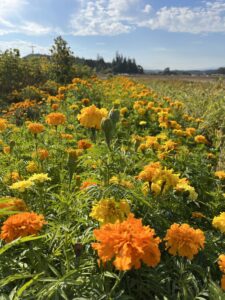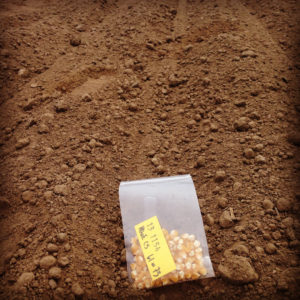

Summer sweet corn: Is there anything better? How about a sweet corn that was developed with organic farmers in mind – an open-pollinated, uniform, and early maturing variety that demonstrates superb taste?
OSA is a proud collaborator in a participatory plant breeding project that developed just that. Supporting the work of breeders at the University of Wisconsin – Madison and farmer-breeder Martin Diffley of Organic Farming Works, OSA is helping to take this soon-to-be-released sweet corn variety to the next level by adapting it to the Pacific Northwest region.
Earlier this month, OSA’s breeders planted a large trial at Nash’s Organic Produce in Sequim, WA, that included more than 90 families. (In plant breeding, a family refers to genetically related plants.) The goal is to identify plants that thrive in our local climate.
Why is this important? This sweet corn trial is just one example of how regional networks of plant breeders and farmers are supporting national efforts to expand farmer options in organically bred seed – seed that will deliver high-quality crops without the assistance of synthetic fertilizers and other chemical inputs.
So when we talk about a “regional seed system,” region-specific plant breeding is a big part of that system, providing farmers seed adapted to their specific climate and environmental conditions – like the need for sweet corn that matures early and reliably in cold soil – while emphasizing enhanced flavor and nutrition.
Most of the sweet corn seed planted in the U.S. was developed – and is owned – by the biggest players in the business: Syngenta and Monsanto. Projects like this one help to reduce farmer reliance on a handful of seed firms that don’t support organic agriculture and seed saving. Farmers can take back control of the seed they sow, but first they need options like this one, and knowledge in seed breeding and production. (Interested growers should download our How to Breed Sweet Corn for Organic Agriculture manual.)
The Port Townsend Food Co-op is a supporter of this breeding effort, and represents another key partner in any regional seed system: the food industry. The co-op understands well the demand among its members for locally produced sweet corn. They also understand the challenges local farmers face in producing sweet corn in a cool, maritime climate. They are funding this trial in the Pacific Northwest to ensure their farmers have access to good seed that produces good food. It’s that simple.
Learn more about our work to build regional seed systems.
